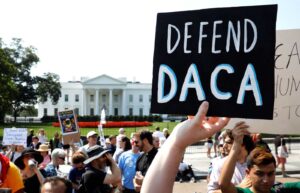by The Cowl Editor on September 14, 2017
National and Global News
By Thomas Edwards ’20
News Staff

Last week, on Tuesday, September 5, through the words of Attorney General Jeff Sessions, President Donald J. Trump rescinded Deferred Action for Childhood Arrivals.
DACA was an American immigration policy established by the Obama administration in June of 2012. The policy gave protection from deportation to undocumented minors for renewable two-year periods, and allowed them to work in the U.S. As of 2017, approximately 800,000 individuals were protected from deportation by DACA.
For the time being, the rescinding of DACA has been delayed for six months in order to give Congress the chance to find a solution for the 800,000 young people currently under the policy and those who were previously eligible.
DACA received mixed responses when it was first initiated and has received nothing less with its termination. Democrats in Washington have especially been vocal about the issue, most of, if not all, denouncing the decision. House Minority Leader Nancy Pelosi said, “President Trump’s decision to end DACA should break the hearts and offend the morals of all who believe in justice and human dignity.” Pelosi, with other Senate and House Democrats, has called on her Republican counterparts to work with the Democrats to form a solution. Rahm Emanuel, Mayor of Chicago, announced a half an hour before the Trump administration’s announcement that “DACA will continue to exist in Chicago,” calling the termination of the program “morally, politically, and economically wrong.”
While the response from Democrats has been largely unanimous, there have been mixed responses from the Republican Party.
Senate and House Republicans have announced their opposition to Trump’s decision to end DACA, among them Senator John McCain from Arizona. McCain said, “President Trump’s decision to eliminate DACA is the wrong approach to immigration policy at a time when both sides of the aisle need to come together to reform our broken immigration system and secure our border… I strongly believe that children who were illegally brought into this country through no fault of their own should be forced to return to a country they do not know.”
Just as there have been Republicans speaking against Trump, there have been those standing behind him. Senate Majority Leader Mitch McConnell said, “President Obama wrongly believe he had the authority to re-write our immigration law. Today’s action by President Trump corrects that fundamental mistake.”
Joining McConnell is House Speaker Paul Ryan who opposed the program when Obama implemented it and hopes Congress can find a permanent solution. “It is my hope that the House and Senate, with the President’s leadership, will be able to find consensus on a permanent legislative solution that includes ensuring that those who have done nothing wrong can still contribute as a valued part of this great country,” said Ryan in a statement after the announcement. Most Republicans speaking in favor of President Trump’s decision have agreed on the unconstitutionality of Obama’s executive decision creating the program and that it should now be instated, though not verbatim, by Congress instead. “I have long supported accommodating those brought to this country illegally through no fault of their own; however, I have always felt that President Obama’s executive action was unconstitutional and that the right way to address this issue was through legislation,” said Senator Marco Rubio.
Lawmakers have not been the only group to speak out openly in response to last Tuesday’s events. Facebook founder Mark Zuckerberg stated, “This is a sad day for our country.” Mark Ruffalo tweeted, “A cowardly act by a cruel, vindictive and heartless administration intent on tearing at the very fabric of the American dream.” Along with tweets and comments from celebrities, there have also been protests and marches, including one Tuesday which marched from the White House toward Trump International Hotel after the announcement.
While opinions from both sides have been voiced, the one common consensus is that now it is up to Congress to pick up the pieces. President Trump reportedly called on Congress to “legalize DACA,” to legislate a program similar to Former President Obama’s, which was created through executive authority, or he will “revisit [the] issue!”
“It is important that the White House clearly outline what kind of legislation the president is willing to sign. We have no time to waste on ideas that do not have the votes to pass or that the president won’t sign,” said Rubio. Other legislators expressed thier desire to continue to give protection to the children. “We must protect children who are already here in this country and those who are currently protected under DACA. That principle is fundamental for me. It’s also clear that we must work in Congress to provide long-term certainty for DACA recipients,” said GOP Representative Cathy McMorris Rodgers. In a simliar spirit, Democratic Senate Whip Dick Durbin said, “It is time for us in Congress to do the right thing.”